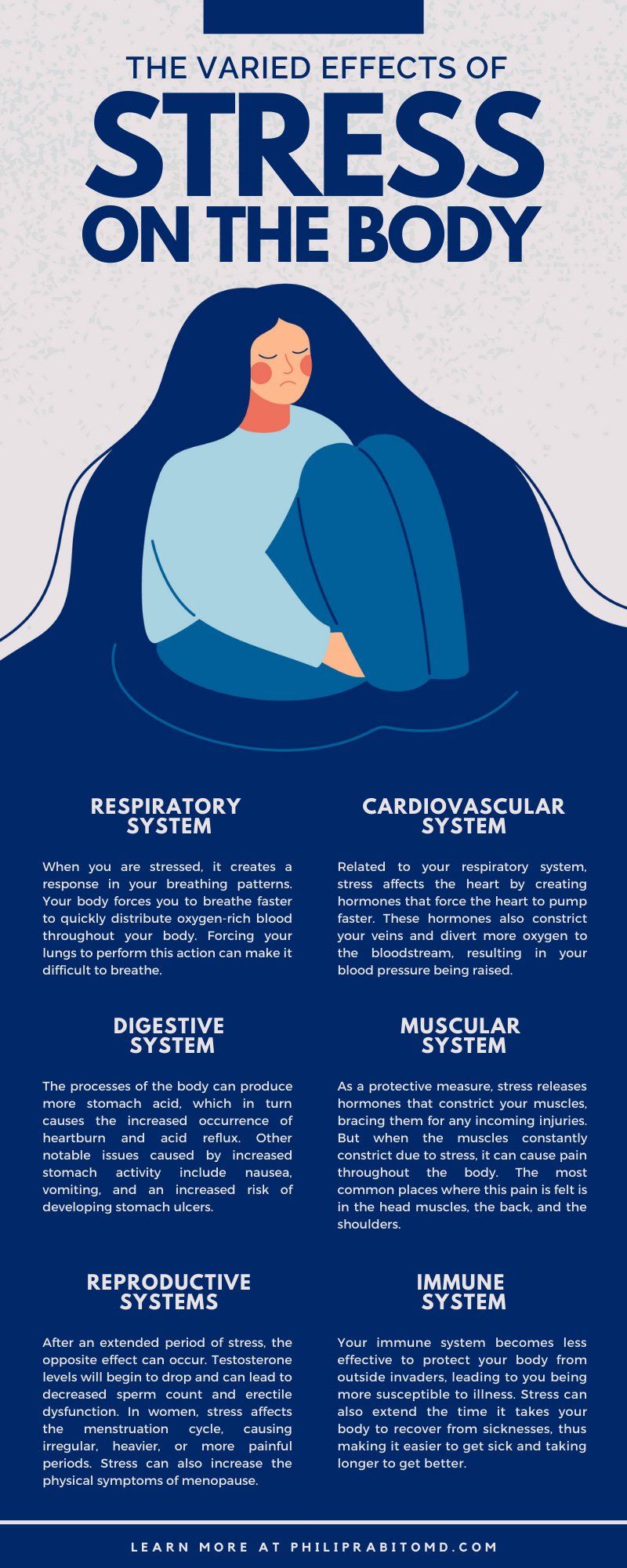
Stress is a natural part of our everyday lives that we must learn how to deal with in a healthy manner. There’s no avoiding the stress-inducing elements of our lives, and we largely can’t control the aspects of our lives that cause us so many problems. However, we can control how we respond to daily stressors by learning how to deal with life’s inconveniences, both large and small.
Knowing how to deal with stress can help you maintain your bodily health as well as your mental wellbeing. Because the varied effects of stress on the body hurt more than just your mental state, it can have physical and chemical effects as well. Know what those side-effects are, and if you find yourself under pressure in your day-to-day, then consider some stress-relieving activities.
How Your Body Responds To Stress
As mentioned, your body can react to stress in several different ways. The reason for this is because stress causes your body to produce certain hormones that set your bodily response into motion.
Many of these responses are meant to aid us in our survival, but chronic stress leads them to harm us instead of help. Humans have developed these hormone responses to better react to danger, but in our modern society, they oftentimes manifest themselves in health issues.
Being aware of what those symptoms look like can help you understand your body better and help explain the side-effects if you are unsure what else could be causing them.
Respiratory System
When you are stressed, it creates a response in your breathing patterns. Your body forces you to breathe faster to quickly distribute oxygen-rich blood throughout your body. Forcing your lungs to perform this action can make it difficult to breathe, a symptom that is made worse if you already have difficulties due to asthma or emphysema.
Cardiovascular System
Related to your respiratory system, stress affects the heart by creating hormones that force the heart to pump faster. These hormones also constrict your veins and divert more oxygen to the bloodstream, resulting in your blood pressure being raised. If you experience chronic stress, it can make your heart work too hard for too long, which can result in a heart attack or stroke.
Digestive System
With increased breathing and a rapid heart rate comes issues with your digestive system. The processes of the body can produce more stomach acid, which in turn causes the increased occurrence of heartburn and acid reflux. Other notable issues caused by increased stomach activity include nausea, vomiting, and an increased risk of developing stomach ulcers.
Muscular System
As a protective measure, stress releases hormones that constrict your muscles, bracing them for any incoming injuries. But when the muscles constantly constrict due to stress, it can cause pain throughout the body. The most common places where this pain is felt is in the head muscles, the back, and the shoulders.
Reproductive Systems
Initially, stress can cause an increase in testosterone in men. But, after an extended period of stress, the opposite effect can occur. Testosterone levels will begin to drop and can lead to decreased sperm count and erectile dysfunction. Chronic stress also runs the risk of increased prostate infection.
In women, stress affects the menstruation cycle, causing irregular, heavier, or more painful periods. Stress can also increase the physical symptoms of menopause.
In both sexes, increased stress results in a reduced sex drive. This comes as a side-effect of more fatigue caused by the physical toll stress takes on the body.
Immune System
While stress-induced responses to the immune system initially strengthen your body’s ability to fight off infection, it has the opposite effect after a prolonged period of time. Your immune system becomes less effective to protect your body from outside invaders, leading to you being more susceptible to illness. Stress can also extend the time it takes your body to recover from sicknesses, thus making it easier to get sick and taking longer to get better.
Results of These Side Effects
While not directly caused by the release of hormones, there are a number of negative consequences that result from experiencing the side-effects of chronic stress on the body, such as:
- Anxiety
- Restlessness
- Lack of motivation
- Irritability and anger
- Depression
Where Does the Stress Response Come From?
The point of origin with the stress response of the body can be found in the endocrine system. Signals from the brain send messages to the hypothalamic-pituitary-adrenal axis to release the necessary chemicals to respond to immediate danger. The two chief chemicals that are released are adrenaline, which increases heart rate and blood pressure, and cortisol, which increases sugar in the bloodstream, increasing the amount of energy you have.
Effective Ways To Manage Your Stress Levels
While you cannot eliminate all stress from your life, you can learn how to better handle and respond to stressful situations. Knowing how to manage your stress can reduce the hormonal responses in your body and leave you feeling better as a result. Some effective stress management strategies include:
- Maintaining a healthy diet.
- Ensuring that you have a full eight hours of sleep at night.
- Regularly exercising and staying in good physical condition.
- Learn calming meditation routines.
- Reducing or eliminating caffeine and alcohol from your diet.
- Give yourself time to relax, calm down, and decompress from a stressful day.
- Remain socially connected with friends and family to have a social support network.
Medical Reasons for Increased Stress
There are times when utilizing stress management techniques don’t seem to help; this may be due to a medical condition that you are not aware of. If you are experiencing a medical condition that results in increased cortisol and adrenaline in your bloodstream, then it will be more difficult to control your stress responses. You may need to seek out the aid of medical professionals who specialize in hormone imbalances.
Dr. Philip Rabito is one such specialist, rated as one of the best endocrinologists in New York City. He can help you successfully navigate your way through your condition.


